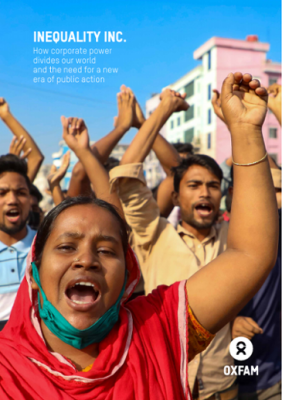Wealth of EU's richest soars while 99% of population is poorer

The EU's five richest billionaires increased their wealth by 76 percent since 2020, from 244 billion euro to 429 billion, at a rate of 5.7 million euros per hour. At the same time, 99 percent of the EU's population has become poorer. These findings are based on Oxfam's new report on inequality and global corporate power. The report also reveals that if current trends continue, the world will have its first trillionaire within a decade, but poverty will not be eradicated for another 229 years.
'Inequality Inc."' published today as business elites gather in the Swiss resort town of Davos, shows that seven out of ten of the world's biggest corporations have a billionaire as CEO or principal shareholder. These corporations are worth 9.3 trillion euros, equivalent to more than the combined GDPs of all countries in Africa and Latin America.
"We're witnessing the beginnings of a decade of division, with billions of people shouldering the economic shockwaves of pandemic, inflation and war, while billionaires' fortunes boom. This inequality is no accident; the billionaire class is ensuring corporations deliver more wealth to them at the expense of everyone else," said Oxfam International interim Executive Director Amitabh Behar.
Despite representing less than six percent of the global population, the EU hosts 15 percent of the world's billionaires and 16 percent of global billionaire wealth. Since 2020, billionaires in the EU increased their accumulated wealth by one-third, reaching 1.9 trillion euros last year.
A progressive wealth tax on EU multi-millionaires and billionaires between two and five percent could raise 286.5 billion euros each year. This could pay 40 percent of the EU's recovery fund.
"Literally, every hour that governments fail to act is worth millions, and the EU is no exception. A European wealth tax is vital to stop us from falling into a new age of billionaire supremacy. By fairly taxing Europe's richest, the EU holds the key to start narrowing the chasm between them and the rest of us," said Chiara Putaturo, Oxfam's EU tax expert.
Mirroring the fortunes of the super-rich, 22 of some of the biggest companies in the EU made 172 billion euros in net profit from July 2022 to June 2023. This is 66 percent more than their average profit for 2018 - 2021.
"Runaway corporate and monopoly power is an inequality-generating machine: through squeezing workers, dodging tax, privatizing the state, and spurring climate breakdown, corporations are funneling endless wealth to their ultra-rich owners. But they're also funneling power, undermining our democracies and our rights. No corporation or individual should have this much power over our economies and our lives -to be clear, nobody should have a billion dollars", said Behar.
An example of a modern monopoly man in the EU is the world's second richest man, the French billionaire Bernard Arnault. He presides over the luxury goods empire LVMH, an umbrella of brands like Christian Dior, Louis Vuitton and Chandon. The group has been fined by France's anti-trust body. He also owns France's biggest media outlet, Les Échos, as well as Le Parisien.
Oxfam's report also shows a 'war on taxation' by corporations. In the EU, the corporate tax rate fell from 32.2 percent in 2000 to 21.5 percent in 2023. Globally, only four percent of the 1,600 largest companies publicly disclose their global tax strategy and corporate income taxes paid in all countries.
People worldwide are working harder and longer hours, often for poverty wages in precarious and unsafe jobs. The wages of nearly 800 million workers have failed to keep up with inflation and they have lost 1.4 trillion euros over the last two years, equivalent to nearly a month (25 days) of lost wages for each worker.
"Every corporation has a responsibility to act but very few are. Governments must step up. There is action that lawmakers can learn from, from US anti-monopoly government enforcers suing Amazon in a landmark case, to the European Commission wanting Google to break up its online advertising business, and Africa's historic fight to reshape international tax rules", said Behar.
Pope Francis' apostolic exhortation, Evangelii Gaudium (The Joy of the Gospel), published in 2013, urges the faithful to respond to the Gospel, to live it more fully and more deeply, reaching out to the poor and broken, ending injustice, and building peace. And finding joy in all of it.
The document spells out:
37. Works of love directed to one's neighbour are the most perfect external manifestation of the interior grace of the Spirit….
48. We have to state, without mincing words, that there is an inseparable bond between our faith and the poor. May we never abandon them.
53. Just as the commandment 'Thou shalt not kill' sets a clear limit in order to safeguard the value of human life, today we also have to say 'thou shalt not' to an economy of exclusion and inequality. Such an economy kills.
How can it be that it is not a news item when an elderly homeless person dies of exposure, but it is news when the stock market loses two points? This is a case of exclusion. Can we continue to stand by when food is thrown away while people are starving? This is a case of inequality.
54. Almost without being aware of it, we end up being incapable of feeling compassion at the outcry of the poor, weeping for other people's pain, and feeling a need to help them, as though all this were someone else's responsibility and not our own.
The culture of prosperity deadens us; we are thrilled if the market offers us something new to purchase. In the meantime, all those lives stunted for lack of opportunity seem a mere spectacle; they fail to move us.
57. I encourage financial experts and political leaders to ponder the words of [Saint John Chrysostom], one of the sages of antiquity: "Not to share one's wealth with the poor is to steal from them and to take away their livelihood. It is not our own goods which we hold, but theirs.
177. …at the very heart of the Gospel is life in community and engagement with others. The content of the first proclamation has an immediate moral implication centered on charity.
187. Each individual Christian and every community is called to be an instrument of God for the liberation and promotion of the poor, and for enabling them to be fully a part of society. This demands that we be docile and attentive to the cry of the poor and to come to their aid.
188. In this context, we can understand Jesus' command to his disciples: "You yourselves give them something to eat!" (Mk 6:37): it means working to eliminate the structural causes of poverty and to promote the integral development of the poor, as well as small daily acts of solidarity in meeting the real needs which we encounter.
189. The private ownership of goods is justified by the need to protect and increase them, so that they can better serve the common good; for this reason, solidarity must be lived as the decision to restore to the poor what belongs to them.
191. In all places and circumstances, Christians, with the help of their pastors, are called to hear the cry of the poor…. Seeing their poverty, hearing their cries and knowing their sufferings, we are scandalized because we know that there is enough food for everyone and that hunger is the result of a poor distribution of goods and income.
198. This is why I want a Church which is poor and for the poor. They have much to teach us. Not only do they share in the sensus fidei, but in their difficulties they know the suffering Christ. We need to let ourselves be evangelized by them….
201. …none of us can think we are exempt from concern for the poor and for social justice….
203. The dignity of each human person and the pursuit of the common good are concerns which ought to shape all economic policies.
Download Oxfam's report 'Inequality Inc': https://policy-practice.oxfam.org/resources/inequality-inc-how-corporate-power-divides-our-world-and-the-need-for-a-new-era-621583/
Read the full exhortation, Evangelii Gaudium: www.vatican.va/content/francesco/en/apost_exhortations/documents/papa-francesco_esortazione-ap_20131124_evangelii-gaudium.html


















